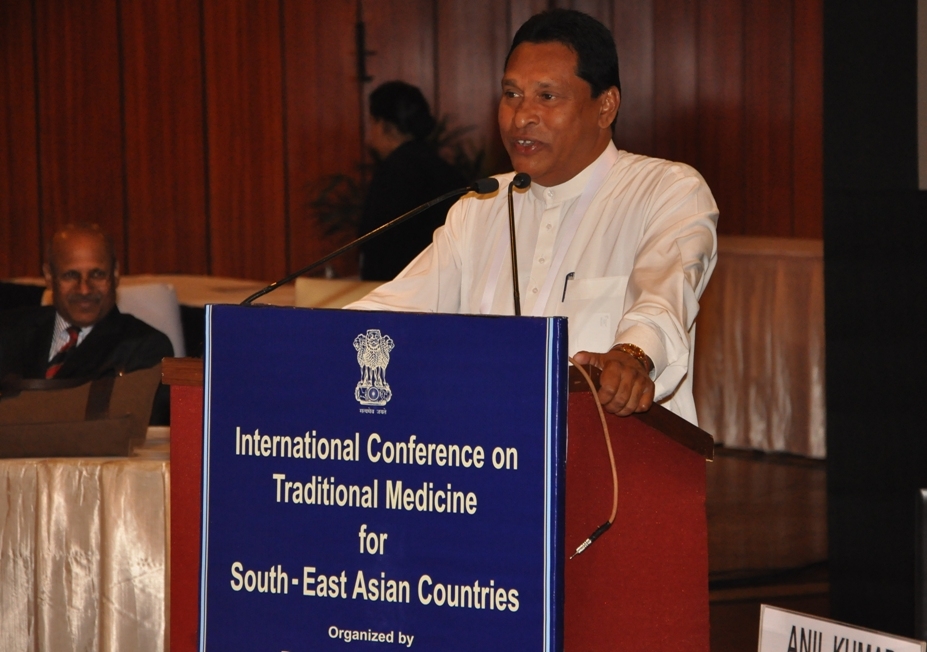
Minister of Indigenous Medicine Salinda Dissanayake attended the two day International Conference on Traditional Medicine for South – East Asian Countries that was held in New Delhi which concluded with the Delhi Declaration. Ministers of India, Bangladesh, Nepal, Bhutan as well as WHO representatives and experts from different parts of the world attended the Conference.

Minister of Indigenous Medicine Salinda Dissanayake attended the two day International Conference on Traditional Medicine for South – East Asian Countries that was held in New Delhi which concluded with the Delhi Declaration. Ministers of India, Bangladesh, Nepal, Bhutan as well as WHO representatives and experts from different parts of the world attended the Conference.
The Indian Minister of Health and Family Welfare Ghulam Nabi Azad chaired the Conference and Ministers of each country made country presentations followed by expert level discussions.
The Sri Lankan delegation besides Minister Dissanayake included High Commissioner Prasad Kariyawasam, Dr. Newton A. Peiris, Advisor, Ministry of Indigenous Medicine and Prof. K.K.D.S. Ranaweera, Director, Bandaranaike Memorial Ayurvedic Research Institute.
The Conference acknowledged the values, strengths and potential of indigenous and traditional medicine. The spirit behind the Delhi Declaration is to foster development of traditional medicine across the region and to share with each other the expertise, technologies, best practices and to extend support and cooperation on the basis of mutual interests and needs.
The Delhi Declaration stated;
A.
We, the Health Ministers of South-East Asian countries, representing the Governments of Bangladesh, Bhutan, India, Nepal, Minister of Indigenous Medicine, Sri Lanka, and Vice Minister of Health, Timor-Leste, and the representatives of DPR Korea, Indonesia, Myanmar, Maldives and Thailand,
met in New Delhi during the “International Conference on Traditional Medicine for South-East Asian Countries”, and we –
1) recalled the importance given at the International Conference on Primary Health Care at Alma Ata in 1978 for inclusion of access to Traditional Medicine in the planning and implementation of health care;
2) noted the progress of Traditional Medicine in the countries of South East Asia Region, specifically after the World Health Organization (WHO) brought out the strategy for Traditional Medicine 2002-2005;
3) considered the importance of various resolutions of the World Health Assembly(WHA) and of the South East Asia Regional Committee for promoting Traditional Medicine and Medicinal Plants, specifically WHA56.31, WHA62.13 and SEA/RC56/R6;
4) appreciated the diversity and richness of Traditional Medical Systems, their courses of study, status of research & development, regulatory frameworks and medicinal flora in the South-East Asian countries;
5) recognized that Traditional Medicine and Traditional Medicine Practitioners have substantial potential to contribute for improving health outcomes in various countries of the world;
6) acknowledged the fact that traditional medicine is culturally acceptable, generally available, affordable and widely used in various countries for the treatment of diseases;
7) noted the fact that for millions of people often living in rural areas in different countries, traditional medicine is a significant source of health care;
8) recognized the potential of traditional medicine in providing primary health care, and 9) expressed the need for sharing of experience and knowledge for securing reliance on Traditional Medicine for public health benefits.
B. DECLARATION
In the light of the above, we hereby agree for cooperation, collaboration and mutual support amongst the South-East Asian Countries in all spheres of Traditional Medicine in accordance with national priorities, legislations and circumstances, and specifically agree to make collaborative efforts aiming at the following:
I. to promote National policies, strategies and interventions for equitable development and appropriate use of traditional medicine in the health care delivery system;
II. to develop institutionalized mechanism for exchange of information, expertise and knowledge with active cooperation with WHO on traditional medicine through workshops, symposia, visit of experts, exchange of literature etc.;
III. to pursue harmonized approach for the education, practice, research, documentation and regulation of traditional medicine and involvement of traditional medicine practitioners in health services;
IV. to explore the possibility of promoting mutual recognition of educational qualifications awarded by recognized Universities, pharmacopoeias, monographs and relevant databases of traditional medicine;
V. to encourage development of common reference documents of traditional medicine for South East Asian countries;
VI. to develop regional cooperation for training and capacity building of traditional medicine experts;
VII. to encourage sustainable development and resource augmentation of medicinal plants in the South East Asian regional countries;
VIII. to establish regional centers as required for capacity building and networking in the areas of traditional medicine and medicinal plants and
IX. to exchange views, experiences and experts for integration of traditional medicine into national health systems in accordance with national policies and regulations.




